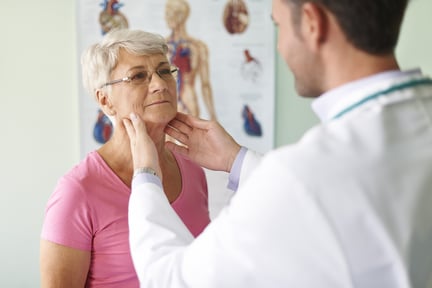The Advanced Practice Provider’s Role in Cancer Care
5 min read

As most patients will need to interact with a number of specialists on their cancer journey, quality oncological care requires a multidisciplinary approach, which includes the expertise of one or more highly trained advanced practice providers (APPs).
According to the Journal of Oncology Practice, APP participation in oncology care is growing substantially, as indicated in the American Society of Clinical Oncology (ASCO) census, which showed a 35.8% growth in oncology APPs over a three-year period between 2014 and 2017. Nurse practitioners (NPs) and physician associates (PAs) are the two most common APPs to engage in a patient’s cancer care.
With an expected shortage of hematologists and oncologists in the near future, APP utilization is crucial, particularly as diagnostic technology improves and more cancer cases are diagnosed. The Centers for Disease Control and Prevention anticipates a 49% increase in cancer diagnoses by 2050, making it clear that APPs are both necessary and appropriate in oncology care.
“APPs play an integral role on the oncology care team,” John Novak, physician associate with Rocky Mountain Cancer Centers (RMCC). “They often provide much of the day-to-day hands-on, direct patient care. Without them, RMCC and other cancer centers would not be able to diagnose and treat as many patients, manage their side effects, and address their diversity of care issues appropriately. Less time would be spent on education needed for communication, reducing our ability to ensure optimal patient care.”
Advanced Practice Provider Qualifications
At RMCC, every patient with cancer benefits from the care they receive from NPs and PAs. To serve in this capacity, advanced practice providers undergo extensive training that requires an advanced postgraduate/master’s degree and more.
Prior to gaining eligibility to care for cancer patients, NPs first become bachelor-prepared registered nurses (RNs). To advance to a licensed nurse practitioner, they must then undergo graduate-level schooling to earn a master’s or doctorate degree. PAs are trained under the medical model and also require a related bachelor’s degree before pursuing an advanced degree that earns them the title of physician associate. Upon graduation, NPs and PAs must also pass a nationally certified exam prior to practicing and prescribing. PAs are legally required to work under the supervision of a physician in a similar fashion to that of a resident working under an attending physician. NPs are permitted to practice independently and other specialties, however, in oncology and here at Rocky Mountain Cancer Centers they also practice under the supervision of a physician.
In addition to general training, many APPs providing oncology care at RMCC pursue cancer-specific training. Among NPs, this training leads to a post-graduate Advanced Oncology Certified Nurse Practitioner (AOCNP) certificate from the Oncology Nursing Certification Corporation. Renewed every five years, the certificate is only eligible to active NPs whose degree had an oncology concentration and who have completed a minimum of 500 supervised hours as an adult oncology nurse. NPs with degrees that did not concentrate in oncology are eligible for certification, but they have additional requirements.
How APPs Provide Cancer Care
Within the oncology environment, advanced practice providers at RMCC perform a wide range of duties, including:
 Caring for the whole patient, considering the mind, body, and spirit
Caring for the whole patient, considering the mind, body, and spirit- Completing a full review of patient health systems
- Conducting physical exams and obtaining a patient’s full medical history
- Educating and assisting patients on disease prevention, side effect management and health maintenance
- Ordering, analyzing, and addressing laboratory findings
- Providing survivorship counseling, palliative care, and assisting in end-of-life discussions
- Managing side effects from various therapies through lifestyle and medication
- Performing biopsies, bone marrow aspirates, spinal taps to diagnose leukemia, and other necessary diagnostic procedures
- Prescribing medications to aid in symptomatic relief during and after treatment
- Referring patients to appropriate specialists and support services
Experts in Patient Experience
Some medical experts step into the care of oncology patients immediately after training. APPs may take a different path, first providing patient care in other healthcare environments, which enables them to enter oncology care with a better understanding of general medicine and the complete health journey. This experience gives them a keen ability to readily recognize patient needs and help them manage their illness.
“Many APPs had prior medical experience before initiating their advanced practice training so they understand the whole gamut of the patient experience,” John said. “Our APPs have a sincere desire to care for our patients. We can generally spend more time with patients, listen to their concerns, and thoroughly explain what to expect during and after treatment. In oncology, we often manage patients for many years and in some cases over a decade, so we work hard to ensure their needs are met and their quality of life is optimized.”
When interacting with patients, APPs focus on the diagnosis and treatment of the disease process but also, the patient’s overall well-being. With their kindness, compassion, and clinical experience, APPs address side-effect management, mental health issues, and health maintenance, while offering supportive resources every step of the way. Depending on the patient's needs and disease state, APP's play an integral role in survivorship counseling, genetic testing/genetic counseling, and linking patients up with the appropriate integrative medicine specialist.
Multiple studies have found that when patients receive education from experts, such as APPs, their overall health and quality of life improves. Patients are better able to understand their disease and gain confidence and trust in their care team and recommended plan of care.
“RMCC’s advanced practice providers look beyond the disease,” John said. “They see and treat the whole person in order to optimize their experience throughout this often challenging journey.”
APPs are integral to the understanding and comfort of a patient’s family members, helping them feel more comfortable and knowledgeable about their loved one’s condition and needs.
Cooperating for Continuity
Caring for oncology patients usually involves a multidisciplinary care team. Depending on a patient’s specific cancer diagnosis, medical oncologists, radiation oncologists, surgical oncologists, reconstructive surgeons, and other cancer specialists may care for a single patient at any given time. These specialists often rely upon APPs at RMCC to help coordinate and reach a shared goal of delivering optimal patient care. APPs are not confined to working with a single cancer care team but will often work with specific providers, whether that be an individual oncologist or surgeon. As a result, a patient could see multiple APPs throughout their cancer journey.
Though a patient may interact with multiple APPs, each provider gives specialized care to ensure continuity. Along with oncologists and surgeons, NPs and PAs provide detailed documentation of each patient’s journey, carefully noting their patient’s health and well-being at each visit, as well as any complications that may develop. This level of close monitoring and tracking provide a roadmap for other providers to follow when the patient moves between specialists. Combined with progress notes from other specialists, APP notes are often utilized to help determine treatment changes and aid with authorization.
As summarized above, APPs play a critical role helping to manage oncology care at RMCC and are a valuable and trusted service for patients with cancer, including yours.
Refer your patient to RMCC for experienced and compassionate cooperative cancer care.